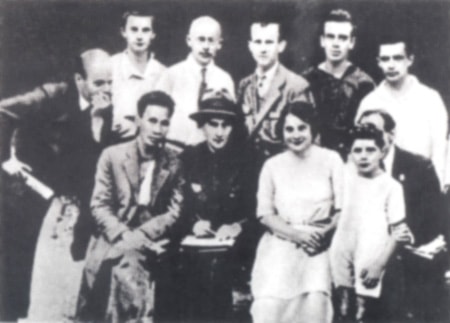In the homeland of the October Revolution
In mid-1923, Nguyen Ai Quoc was sent by the French Communist Party to Russia to study and train. On October 10, 1923, at the International Peasants' Congress, Nguyen Ai Quoc attended as an official representative of the Indochinese peasants and was invited to speak at the Conference.
In mid-1923, Nguyen Ai Quoc was sent by the French Communist Party to Russia to study and train. On October 10, 1923, at the International Peasants' Congress, Nguyen Ai Quoc attended as an official representative of the Indochinese peasants and was invited to speak at the Conference.
In his speech, he spoke about the situation of the Indochinese peasants and presented his views on how to organize, mobilize and enlighten the struggle for the peasant class. After that, he wrote many articles published in the International Peasant Magazine, from which he affirmed that to eliminate the oppression and injustice of colonial peasants, there was no other way but to fight to successfully implement the slogan: "All land belongs to the peasants".
In 1924, the Communist International established the Oriental University to train revolutionary cadres for Asian countries, and Nguyen Ai Quoc was introduced to attend a short-term course.
 |
Comrade Nguyen Ai Quoc with some delegates attending the 5th International Communist Congress.Photo archive |
Here, he was equipped with the principles of class struggle and methods of conducting revolutionary struggle. He strove to learn theoretical knowledge and at the same time gathered materials from Chinese students to write the book "China and Chinese Youth", which later became a typical book of the Moscow City Youth Union.
Once, the Soviet poet Osip Mandelstam came to the school to meet Nguyen Ai Quoc. The two talked intimately and exchanged views on Eastern culture, colonial peoples and the path of revolutionary struggle. Afterwards, the Soviet poet wrote an article: "Visiting a Communist International soldier" published in the Little Flame newspaper.
The article reads: "From Nguyen Ai Quoc radiates a culture, not European culture, but perhaps the culture of the future... Through Nguyen Ai Quoc's noble gestures and calm voice, I see tomorrow, see the prospect of calm skies and calm seas of world friendship as vast as the ocean."
When he heard of Lenin's death, overcoming his boundless grief and the harsh cold, he stayed up all night to write the article "Lenin and the Colonial Peoples" published in Pravda, the Central organ of the Communist Party of the Soviet Union, on the day of the funeral. The article praised Lenin as the leader of the whole world, the one who lit the flame illuminating the path to the future...
After graduating from the Oriental University, Nguyen Ai Quoc was assigned to work at the Oriental Department of the Communist International. He was often invited to speak at rallies and was granted a special permit to freely enter and exit Red Square.
At the 5th Congress of the Communist International (July 1924), he emphasized the relationship between the fate of the proletariat in imperialist and colonial countries and the proletariat in colonial countries and the need for international solidarity in the fight against the common enemy. He continued to affirm this point of view at the 3rd Congress of the Red Trade Union International.
Living, studying and working in the homeland of the great Russian October Revolution, Nguyen Ai Quoc always believed that the Soviet country and people were the support and solid fortress of colonial peoples on the path of fighting for the right to live and the future...
Cong Kien (St&bs)
